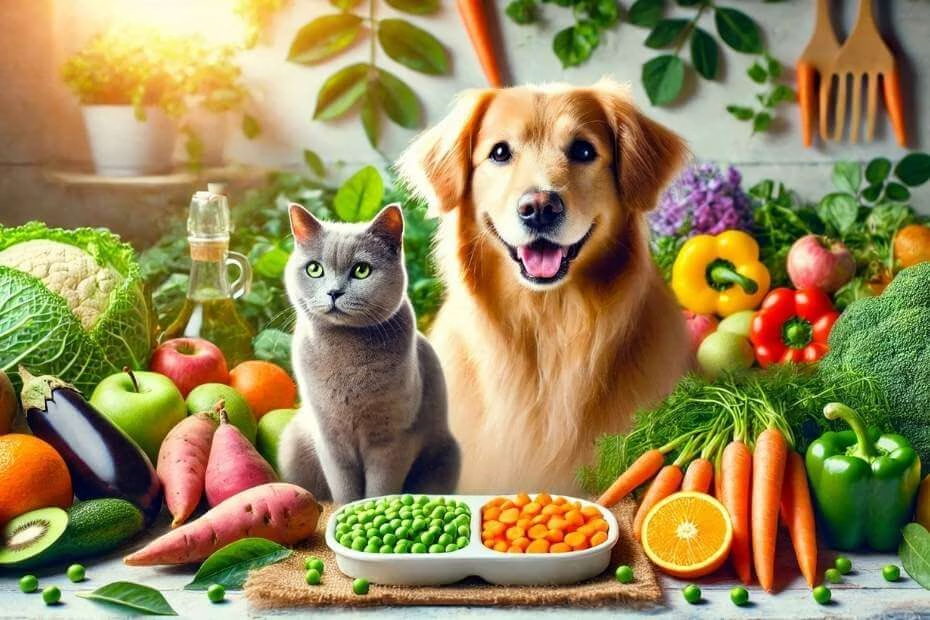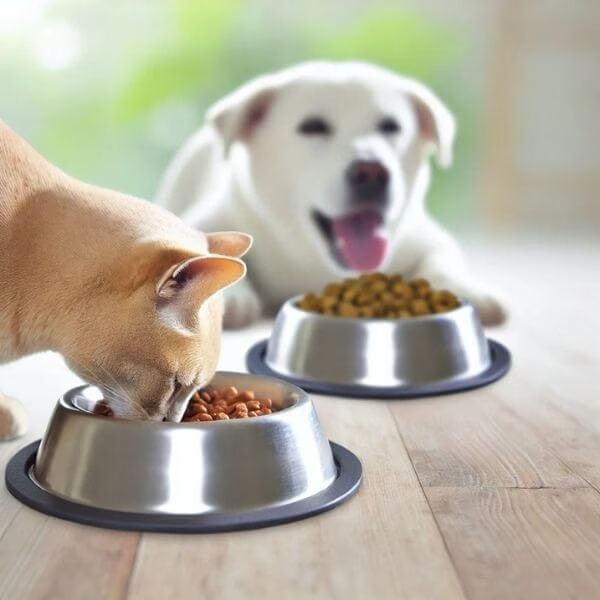Plant-based diets for pets aren’t just the latest buzz—they’re becoming a real option for pet owners who want the best for their furry friends and the planet. But what exactly is a plant-based diet for pets? Simply put, it focuses on plant ingredients like grains, veggies, and legumes rather than animal-based proteins.
Traditionally, cats and dogs have been seen as carnivores. However, modern research suggests that pets can thrive on a well-planned plant-based diet. And no, this doesn’t mean just tossing carrots and peas into your dog’s bowl! It’s all about crafting balanced meals that meet their nutritional needs.
More and more pet owners are considering this switch, driven by concerns about the environmental impact of traditional pet food and the desire to promote animal welfare. The numbers show it: the plant-based pet food market is growing fast, reflecting a broader trend in plant-based living.

Can Pets Really Thrive on Plant-Based Diets?
The first thing that might pop into your head is, “Can a plant-based diet really meet all my pet’s needs?” Good news—many plant-based foods are packed with essential nutrients that dogs, and even cats, can benefit from with the right balance.

Plant-based diets offer crucial nutrients like proteins, vitamins, and minerals. Ingredients like quinoa, lentils, and sweet potatoes are packed with protein and great for digestion. And let’s be honest—keeping a pet’s digestive system happy is always a win!
The big concern is protein since pets traditionally get theirs from meat. But don’t worry—plants have your back! Legumes like peas and chickpeas are excellent sources of protein. It’s all about ensuring they get a balanced mix of amino acids to meet their protein needs.
Plants are powerhouses when it comes to vitamins and minerals. Spinach and kale, for example, are loaded with iron and antioxidants, keeping your pet’s health in tip-top shape. These diverse ingredients add flavor and texture to your pet’s meals, keeping things interesting.
Of course, no one diet works for every pet, so it’s always a good idea to talk to your vet before making any changes. They can help you create a plan tailored to your pet’s unique needs—whether that’s their age, breed, or any specific health considerations.
Important Considerations and Potential Risks
While a plant-based diet might work well for some pets, it’s essential to understand the specific needs of cats and dogs before making the switch.
Cats

Cats are obligate carnivores, meaning their bodies are biologically designed to thrive on a meat-based diet. They require certain nutrients—like taurine, vitamin A, and arachidonic acid—that are naturally found in animal products.
While plant-based diets can include synthetic versions of these nutrients, getting the right balance is challenging. A taurine deficiency, for example, can lead to heart and vision issues in cats, so plant-based diets for cats should be approached with extreme caution and under veterinary guidance.
Dogs

Dogs are omnivores, which means they can handle a more varied diet, including plant-based foods. While many dogs can do well on a plant-based diet if carefully planned, there are still potential risks to keep in mind. A poorly balanced diet can lead to protein deficiencies, a lack of essential fatty acids, or an imbalance in amino acids. Dogs may also experience digestive issues if they aren’t gradually transitioned to plant-based foods.
Monitoring Health
It’s crucial to watch for signs that a plant-based diet may not be working for your pet. Monitor their coat condition, energy levels, weight, and overall behavior. Significant changes might indicate nutritional gaps, so regular check-ups with a vet are essential.
Choose Quality Brands
Plant-based pet food brands vary widely in quality. Opt for brands that use veterinary-researched formulations and provide a comprehensive breakdown of ingredients and nutrients. Transparent labeling is essential; choosing products with balanced, vet-approved nutrition profiles can help mitigate the risks.
The Environmental and Ethical Upside
Switching to a plant-based diet isn’t just great for your pet’s health—it’s also a win for the environment. Commercial pet foods have a hefty environmental footprint, contributing to greenhouse gas emissions and more. If you want to explore this further, check out our article on the ecological impact of commercial pet foods.
By contrast, plant-based diets require far fewer resources. In fact, studies show that choosing plant-based meals for your pets can shrink their carbon pawprint significantly. It’s a small change that packs a big punch for the planet.
Ethical considerations come into play, too. If you care about humanely treating animals, reducing the demand for animal-based products is a powerful way to align your values with your pet’s diet. Companies like The Honest Kitchen and Wild Earth now create sustainable, nutritious pet foods with ethics in mind.
Practical Tips for Transitioning Your Pet
Thinking of making the switch? Here’s how to transition your pet to a plant-based diet with ease:

- Start slow: Gradually introduce plant-based foods alongside their current meals to avoid upsetting their digestive system. Slow and steady wins the race here!
- Monitor closely: Monitor your pet’s energy levels, coat condition, and overall behavior. Discuss any significant changes (good or bad) with your vet.
- Pick a good brand: Not all plant-based pet foods are created equal, so look for brands that are transparent about their ingredients and nutrient profiles. Brands with vet-approved formulations are always a smart choice.
- Tailor to your pet’s needs: Every pet is different. Ensure the diet suits their age, breed, and any health conditions they may have.
- Real-life experiences: Check out testimonials from other pet owners who’ve made the switch. Their insights can be super helpful as you navigate any challenges and celebrate the wins.
Making this change can be both exciting and rewarding, not just for your pet but for the planet, too. With the right approach and guidance, your pet can enjoy a plant-based diet that’s packed with nutrition, aligns with your values, and helps the environment.
